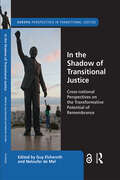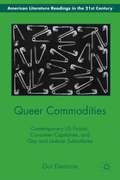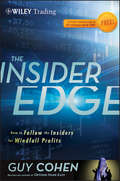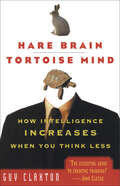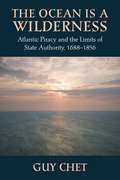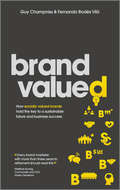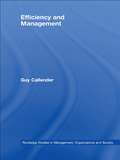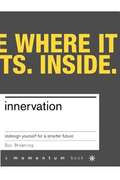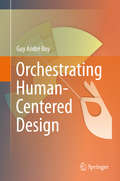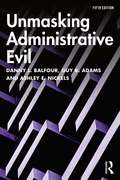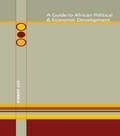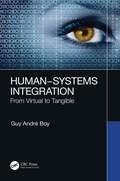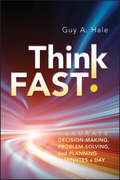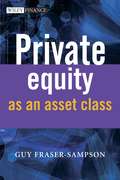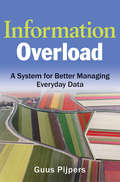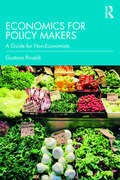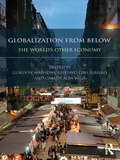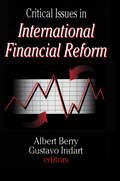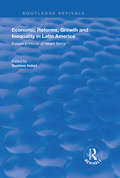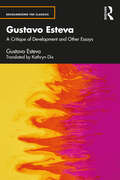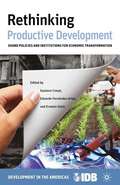- Table View
- List View
In the Shadow of Transitional Justice: Cross-national Perspectives on the Transformative Potential of Remembrance (Europa Perspectives in Transitional Justice)
by Guy ElcherothThis volume bridges two different research fields and the current debates within them. On the one hand, the transitional justice literature has been shaken by powerful calls to make the doctrine and practice of justice more transformative. On the other hand, collective memory studies now tend to look more closely at meaningful silences to make sense of what nations leave out when they remember their pasts. The book extends the scope of this heuristic approach to the different mechanisms that come under the umbrella of transitional justice, including legal prosecution, truth-seeking and reparations, alongside memorialisation. The 15 chapters included in the volume, written by expert scholars from diverse disciplinary and societal backgrounds, explore a range of practices intended to deal with the past, and how making the invisible visible again can make transitional justice - or indeed, any societal engagement with the past - more transformative. Seeking to combine contextual depth and comparative width, the book features two key case analyses - South Africa and Sri Lanka - alongside discussions of multiple cases, including such emblematic sites as Rwanda and Argentina, but also sites better known for resisting than for embracing international norms of transitional justice, such as Turkey or Côte d’Ivoire. The different contributions, grouped in themed sections, progressively explore the issues, actors and resources that are typically forgotten when societies celebrate their pasts rather than mourning their losses and, in doing so, open new possibilities to build more inclusive processes for addressing the present consequences of past injustice.
Queer Commodities
by Guy DavidsonQueer Commoditiesis the first book-length analysis of same-sexuality and consumer capitalism in contemporary US fiction. Moving beyond the critical tendencies to identify gay and lesbian subcultures as either hopelessly immersed in consumer capitalism or heroically resistant to it, Guy Davidson argues that while these subcultures are necessarily commodified, they also provide means of subversively negotiating aspects of life under capitalism.
The insider edge: How to Follow the Insiders for Windfall Profits (Wiley Trading #582)
by Guy CohenBestselling trading author Guy Cohen introduces the OVI indicator to stock trading More fortunes are made from trading stocks than any other financial instrument, and these windfalls are available to anyone who has access to the right information. Presenting the methods used by the best traders in the market, The Insider Edge: How to Follow the Insiders for Windfall Profits uses options transaction data to reveal what "informed traders" are doing, and how anyone can take advantage of these techniques. Whether the markets are choppy or trending, it always pays to wait for a clear opportunity. Any good trader knows that they need an Edge to excel, and this book demonstrates how the combination of specific chart patterns, author Guy Cohen's proprietary OVI indicator, and a robust trading plan, when combined, will deliver success. In The Insider Edge, Guy Cohen reveals: How you can profit from options without having to trade or even understand them! Why the smart money often gravitates to the options markets. How options transactions can often reveal the direction of the stock price. How you can trade using information typically reserved for the pros. A trading plan the delivers maximum safety and windfall profits. How to use his proprietary OVI indicator online for free, so you can start to follow the insiders. The author emphasises that The Insider Edge is for anyone who wants to trade stocks. No options knowledge is required to benefit from this book. His method involves observing what the smart options traders are doing, and then following them. This is what gives you The Insider Edge.
Hare Brain, Tortoise Mind: How Intelligence Increases When You Think Less
by Guy Claxton“Backs up anecdotal studies of creativity with up-to-date Information about the latest research into brain function . . . a fascinating book.” —Anthony Storr, author of Solitude: A Return to SelfIn these accelerated times, our decisive and businesslike ways of thinking are unprepared for ambiguity and paradox, and we’ve lost our appreciation for the value of “sleeping on it.” We assume that the quick-thinking hare brain will beat out the slower intuition of the tortoise mind. But new research in cognitive science is changing this understanding of human mental processes. It suggests that patience and confusion—not rigor and certainty—are the essential precursors of wisdom.With a compelling argument that the mind works best when we trust our unconscious, or “undermind,” psychologist Guy Claxton makes an appeal that we be less analytical and let our creativity have free rein. He also encourages reevaluation of society’s obsession with results-oriented thinking and problem-solving under pressure. Packed with interesting anecdotes, a dozen puzzles to test your reasoning, and the latest related research, Hare Brain, Tortoise Mind is an Illuminating, uplifting, stimulating read that focuses on a new kind of well-being and cognition.“The essential guide to creative thinking.” —John Cleese“His multidisciplinary approach is beautifully executed.” —Kirkus Reviews“Counterintuitive . . . provocative . . . While Claxton speaks the language of cognitive science, his ideas resonate with Freud’s description of the unconscious, Buddhist concepts of the divine ground of existence and the great Romantic poets’ notions of the fount of creativity.” —Publishers Weekly
This is Social Commerce
by Guy ClappertonThe first book to market on the hottest topic on the web Social commerce is the new buzz word and this book will be the first to cut through the hype and tell you exactly what it all means. . . and how to do it. Social media has moved on, it's not enough to just be engaging your customers in fun chit-chat, now you can sell to them directly through their favourite social media platform. ASOS, the fashion website, have just set up a commerce site on Facebook and people are scrambling to follow in their footsteps. No longer do you have the nightmare of dragging people from their social networking site to your homepage - you can get them buying right where they are! In this follow up to This Is Social Media Guy Clapperton uses the same easy-to-follow visuals and instructions to break the process down and show you exactly how to set up your own social commerce operation and how to make it a success. Includes: Step-by-step guide to setting up your own commerce site within social media platforms such as Facebook Building a loyal community who will keep coming back and buying from you How to offer superb customer service to your social media consumers Developing new product especially for this new environment Measuring your ROI
This is Social Media
by Guy Clapperton*UPDATED FOR 2011. Including new info on mobile devices, new platforms and location based social networking.*Anyone in business can use social media to increase brand awareness, customer loyalty and sales. This is Social Media shows you how.You might already be social networking on Facebook, or even microblogging on Twitter. One thing's for sure though; you're too busy to muck about on these sites all day, not really knowing how to get any decent play out of them. You're looking for profitability, not gimmicks.Many organizations, large and small, are using social media and social networking to build robust communities of followers, stay ahead of the competition and increase profits. Are you missing a trick? This is the definitive guide to using the whole spectrum of social media in an efficient and measurable way in order to market your business. It covers Twitter, Facebook, LinkedIn, Ecademy, Flickr, YouTube, Bebo, MySpace, Blogs, Podcasts, Mobile and much, much more. Each site is assessed not as an end in itself but as means of delivering a business result.With simple, practical steps, real life examples and quick definitions to explain the jargon, you'll soon understand the world of social media and have access to a range of social networking tactics that will help you reach new customers and clients, as well as get your existing ones to do more business with you.
The Ocean Is A Wilderness: Atlantic Piracy And The Limits of State Authority, 1688-1856
by Guy ChetHistorians have long maintained that the rise of the British empire brought an end to the great age of piracy, turning the once violent Atlantic frontier into a locus of orderly commerce by 1730. In this book, Guy Chet reassesses that view by documenting the persistence of piracy, smuggling, and other forms of illegal trade throughout the eighteenth century despite ongoing governmental campaigns to stamp it out. the failure of the Royal Navy to police oceanic trade reflected the state's limited authority and legitimacy at port, in the courts, and in the hearts and minds of Anglo-American constituents. Chet shows how the traditional focus on the growth of the modern state overlooked the extent to which old attitudes and cultural practises continued to hold sway. Even as the British government extended its naval, legal, and bureaucratic reach, in many parts of the Atlantic world illegal trade was not only tolerated but encouraged. In part this was because Britain's constabulary command of the region remained more tenuous than some have suggested, and in part because maritime insurance and wartime tax policies ensured that piracy and smuggling remained profitable. When Atlantic piracy eventually waned in the early nineteenth century, it had more to do with a reduction in its profitability at port than with forceful confrontation at sea. Challenging traditional accounts that chronicle forces of civilization taming a wild Atlantic frontier, this book is a valuable addition to a body of borderlands scholarship reevaluating the relationship between the emerging modern state and its imperial frontiers.
Brand Valued
by Fernando Rodes Vila Guy ChampnissNew techniques to refresh and recharge your brandsHow do you establish and maintain a strong long-term relationship between your brand and your consumers? Successful brand managers know that it is all about trust and keeping the consumers engaged.The success of recent "green" campaigns as a means of connecting with, satisfying, and attracting new consumers is just the tip of the iceberg. As the international playing field continues to be leveled, in order to sustain and expand their success, brand owners must interact with their customers more than ever before, forging new and stronger links, and increasing their stock of social capital.At last, there is a book that addresses the growing significance of social capital in the business world. Brand Valued explores how as the strength, depth, and quality of interactions between a brand and its customers improve, increased opportunities to demonstrate trustworthiness arise. This in turn creates a self-fulfilling cycle, wherein trust begets social capital, which begets more trust--and even shared thinking--not to mention better sales.Brand Valued will receive the full support of Havas, the fifth largest global communication and marketing services group in the world.In easy to understand terms, and using concrete examples, Brand Valued provides:The tools necessary to stimulate dialogue--and new ways of thinking--between a brand and its intended audienceMethods for extending brand messaging to wider audiencesIdeas on how to make brands the engines of social capital, getting rid of unsustainable practices to foster more sustainable patterns of consumer behaviourSuggestions for the development of a new brand strategy that reduces costs through innovative and lasting solutions to problemsUnpublished data on the role of consumer trust in new products based on research carried out by the Havas Group across over 150 brands in nine different marketsA wiki component to the book in an accompanying website.Designed to forge stronger channels of dialogue and communication with customers and consumers, the book is a must-read for anyone committed to keeping their brand relevant in the twenty-first century.
Efficiency and Management (Routledge Studies in Management, Organizations and Society)
by Guy CallenderIt is widely accepted that management concepts such as strategic management, human resource management and management development have a well-defined body of knowledge designed to inform management praxis, however the notion of efficiency has no such body of knowledge to support its application within management praxis. This book proposes the replacement of the generalised term efficiency with the more comprehensive notion of performance efficiency to provide a reliable basis on which to evaluate management behaviour. Given the scope of the investigation, the outcome is not designed to prove the success or failure of the inherent nature of efficiency, but rather to establish a new starting point for yet wider empirical research. At a macro-level, it advances the proposition that the notion of efficiency has become an ideological statement of support for any management intention rather than a practical means to inform or evaluate a range of management actions.
Innervation: Redesign Yourself For A Smarter Future
by Guy BrowningIn the new economy you are in charge of your own career. You have more opportunities than ever before, but in order to take full advantage of them you mustlearn a vital new skill--personal innovation. Innervation shows you how to master this essential skill and thrive in a world of continuous change.
Orchestrating Human-Centered Design
by Guy BoyThe time has come to move into a more humanistic approach of technology and to understand where our world is moving to in the early twenty-first century. The design and development of our future products needs to be orchestrated, whether they be conceptual, technical or organizational. Orchestrating Human-Centered Design presents an Orchestra model that attempts to articulate technology, organizations and people. Human-centered design (HCD) should not be limited to local/short-term/linear engineering, but actively focus on global/long-term/non-linear design, and constantly identify emergent properties from the use of artifacts. Orchestrating Human-Centered Design results from incremental syntheses of courses the author has given at the Florida Institute of Technology in the HCD PhD program. It is focused on technological and philosophical concepts that high-level managers, technicians and all those interested in the design of artifacts should consider. Our growing software -intensive world imposes better knowledge on cognitive engineering, life-critical systems, complexity analysis, organizational design and management, modeling and simulation, and advanced interaction media, and this well-constructed and informative book provides a road map for this.
Unmasking Administrative Evil
by Guy B. Adams Danny L. Balfour Ashley E. NickelsThe relationship between evil and public affairs, as well as other fields and professions in public life, has come to the fore as institutions of government seek new ways to operate in an environment of extreme mistrust. Unmasking Administrative Evil, 5th Edition argues that the tendency toward administrative evil, as manifested in acts of dehumanization and genocide, is deeply woven into the identity of public affairs. Indeed, ordinary people may simply act appropriately in their organizational role—in essence, just doing what those around them would agree they should be doing—and at the same time, participate in what a critical and reasonable observer, usually well after the fact, would call evil. Even worse, under conditions of moral inversion, ordinary people can all too easily engage in acts of administrative evil while believing that what they are doing is not only correct, but in fact, good. This 5th edition offers important updates, including: A thorough discussion of contemporary virtue ethics as the field has evolved to offer an alternative to technical/rational ethics. An all-new three-part structure (What is Administrative Evil?, History and Cases, and The Future of Ethics in Praetorian Times) designed to aid in course organization and instruction. All-new cases, including an examination of the Flint water disaster, to provide contemporary examples of how populations can be marginalized and harmed by administrative processes that are blind to their consequences until it is too late. Laying the groundwork for a more ethical and democratic public life – one that recognizes its potential for evil, and avoids state-sponsored dehumanization and destruction – Unmasking Administrative Evil, 5th Edition is required reading for all students of administrative ethics and public service ethics, as well those in other administrative sciences.
Guide to African Political and Economic Development
by Guy ArnoldFirst Published in 2001. Routledge is an imprint of Taylor & Francis, an informa company.
Human–Systems Integration: From Virtual to Tangible
by Guy André BoyHuman–Systems Integration: From Virtual to Tangible Subject Guide: Ergonomics and Human Factors This book is an attempt to better formalize a systemic approach to human–systems integration (HSI). Good HSI is a matter of maturity… it takes time to mature. It takes time for a human being to become autonomous, and then mature! HSI is a matter of human–machine teaming, where human–machine cooperation and coordination are crucial. We cannot think engineering design without considering people and organizations that go with it. We also cannot think new technology, new organizations, and new jobs without considering change management. More specifically, this book is a follow-up of previous contributions in human-centered design and practice in the development of virtual prototypes that requires progressive operational tangibility toward HSI. The book discusses flexibility in design and operations, tangibility of software-intensive systems, virtual human-centered design, increasingly autonomous complex systems, human factors and ergonomics of sociotechnical systems, systems integration, and changed management in digital organizations. The book will be of interest to industry, academia, those involved with systems engineering, human factors, and the broader public.
Unmasking Administrative Evil
by Guy Adams Danny BalfourThe modern age with its emphasis on technical rationality has enabled a new and dangerous form of evil--administrative evil. Unmasking Administrative Evil discusses the overlooked relationship between evil and public affairs, as well as other fields and professions in public life. The authors argue that the tendency toward administrative evil, as manifested in acts of dehumanization and genocide, is deeply woven into the identity of public affairs. The common characteristic of administrative evil is that ordinary people within their normal professional and administrative roles can engage in acts of evil without being aware that they are doing anything wrong. Under conditions of moral inversion, people may even view their evil activity as good. In the face of what is now a clear and present danger in the United States, this book seeks to lay the groundwork for a more ethical and democratic public life; one that recognizes its potential for evil, and thereby creates greater possibilities for avoiding the hidden pathways that lead to state-sponsored dehumanization and destruction. What's new in the Fourth Edition of Unmasking Administrative Evil: UAE is updated and revised with new scholarship on administrative ethics, evil, and contemporary politics. The authors include new cases on the dangers of market-based governance, contracting out, and deregulation. There is an enhanced focus on the potential for administrative evil in the private sector. The authors have written a new Afterword on administrative approaches to the aftermath of evil, with the potential for expiation, healing, and reparations.
Think Fast!: Accurate Decision-Making, Problem-Solving, and Planning in Minutes a Day
by Guy A. HaleApply proven critical thinking processes and supercharge your business Alamo Learning Systems has been providing Critical Thinking Skills (CTS), problem solving, decision-making, preventive action, and innovation training solutions to the corporate world for more than 35 years. <P><P>They have been at the forefront of such movements in management as ISO 9000, Six Sigma, and Lean Manufacturing. Now, in Think Fast!, these CTS experts bring you an up-to-the-minute toolbox of strategies and tactics you can use to optimize your business. This useful and easy-to-read guide looks at real-world consumer issues, giving you top-level skills to address a wide range of practical business, professional, and life problems. Alamo's CTS solutions have been proven effective in major companies, including 200 of the current Fortune 500 Uses real examples from outside the business world to make problems and solutions widely accessible At last, the Critical Thinking Skills that have guided some of the world's most successful companies are available to readers of this insightful guide. Start rethinking your business today, and take your business skills--and business results--to the next level.
Private Equity as an Asset Class
by Guy Fraser-SampsonGuy Fraser-Sampson draws upon twenty years' private equity experience to provide a practical guide to mastering the intricacies of this highly specialist asset class. Aimed equally at investors, professionals and business school students, it starts with such fundamental questions as "what is private equity?" and progresses to detailed analysis of venture and buyout returns. It also unveils a totally new concept which looks set to revolutionise thinking in the industry: Total Return investing. Often unfairly reviled, and frequently misunderstood, private equity differs from all other asset classes in various important respects, not least in the nature and timing of its returns, which require a whole new approach for those reared on more traditional investments such as bonds and shares. This book shows how a good grasp of the basic structure of private equity vehicles and returns (including the dreaded J-curve) can lead to full understanding of the techniques needed to measure and analyse performance. Key points include: A glossary of private equity terms Venture funds and transactions Buyout funds and transactions Understanding private equity returns Analysis of historic returns How to plan a fund investment programme How to conduct effective due diligence Total Return investing
Information Overload
by Guus PijpersWorld-class guidance on using information to achieve better performance Examining the characteristics of information and the latest findings in cognitive science, this book shows how the mind works, how it can be used to think optimally about your business, and how to improve business performance with better information management practices. Provides the process and tools necessary to identify this information and how to remember it, and how to better use the people around you to obtain the best information Reveals how to handle all of the hundreds of pieces of information received daily Provides case studies as well as checklists that show managers how to implement the methodology presented in the book Innovative and ahead of its time, this book helps you take control of all the information that enters your life, get better informed, and have more time for the important issues you face within your business.
Economics for Policy Makers: A Guide for Non-Economists
by Gustavo RinaldiCertain key economic decisions taken by organizations and indeed countries are often not made by economists but by businessmen, trade unionists, politicians and policy-makers. Those who employ people, those who represent workers, those who make laws and those who elect them need economics but may have little time or desire to study it. This book makes economics easily available to everyone. The author’s use of simple language and avoidance of technical jargon provides non-economists with a better understanding of economic reasoning and the tools "to know and to decide". The author achieves this through introducing key concepts in short presentations and arming the reader with selected press articles and recent research using these concepts. An analysis of these demonstrates how a general concept can be derived from a specific context and highlighted questions provide the basis for further debate. The reader can then focus on the parts most relevant to their own needs. This book will have great appeal to employers, trade unionists and public officials attending courses organized by international institutions, professional training providers, as well as graduate students of courses where economics is an important element, especially in relation to its policy implications. Finally, it is invaluable for anybody who has wanted to learn the basics of practical economics but has been deterred by its technicalities.
Globalization from Below: The World's Other Economy
by Gordon Mathews Gustavo Lins Ribeiro Carlos Alba VegaThis book explores globalization as actually experienced by most of the world’s people, buying goods from street vendors brought by traders moving past borders and across continents under the radar of the law. The dimensions and practices of ‘globalization from below’ are depicted and analyzed in detail by a team of international scholars. Topics covered include the ‘New Silk Road’, African traders in China, street hawking in Calcutta and pirate CDs in Mexico. The chapters provide intimate portrayals of routes, markets and people in locations across the globe and explore theories that can help make sense of these complex and fascinating case studies. Students of globalization, economic anthropology and developing-world economics will find the book invaluable.
Critical Issues in International Financial Reform
by Gustavo IndartCritical Issues in International Financial Reform addresses weaknesses of the current international financial system and potential beneficial reforms. The focus is on the countries of Latin America and the Caribbean, but the authors also take into account relevant lessons from the experience of Canada, a country highly integrated into world and hemispheric trade and financial markets.Critical Issues offers a new perspective on a discussion too often dominated by interest groups that take strong, even rigid, positions on issues with limited understanding of the technical aspects of the issues, and little concern for the interests of the developing world. Its chapters have been written by experts in the economic, political, and social aspects of the international financial integration of developing countries. Financial crises and their associated social and economic traumas are the most apparent symptom that something is amiss in the process of world economic integration. But there are also broader questions about the nature and magnitude of the benefits and costs of increased international capital flows for different groups of countries in the developing and developed worlds. For example, even in the absence of turbulence, is it optimal for all participants that capital movements be as free as possible? Does capital inflow discourage domestic savings to a degree that should cause worry? Are some types of flows inherently more beneficial than others--for instance, direct investment flows versus flows into host stock markets? How can the instability of capital movements best be curtailed? These questions concern the contributors to this volume.This volume demonstrates that the evolution of the world financial system, its various problems, and what is or is not done about them require an understanding of the links among financial, economic, and political variables. Critical Issues in International Financial Reform is an important contribution to this debate, and will be of value to researchers in economic policy, history, and international politics.Albert Berry is professor of economics at the University of Toronto and research director of the Program on Latin America and the Caribbean. Gustavo Indart is special lecturer of economics and the coordinator of the Program on Latin America and the Caribbean at the University of Toronto.
Economic Reforms, Growth and Inequality in Latin America: Essays in Honor of Albert Berry (Routledge Revivals)
by Gustavo IndartOriginally published in 2004. Growth, income distribution, and labour markets are issues of pivotal importance in the Latin American context. Examining unique theoretical issues and the empirical evidence, this book provides a critical analysis of the key elements of income distribution determinants, labour market functions, trade policies, and their interrelations. As the advance of globalization becomes seemingly unstoppable, this book provides an important reappraisal of the impact of this new phenomenon, and in particular, the pernicious impact it may have on income growth and distribution. The key objective of the volume is to integrate more fully the analysis of trade and labour market economists, in order to better understand the labour market and income distribution implications of globalization and international integration. Forty years after the early calls to appropriately investigate the micro foundations of macroeconomics, the separation of the two at the policy level is more damaging than ever before - particularly for developing regions; this volume therefore makes an important contribution at the theoretical and policy levels by bringing together macroeconomic and microeconomic analyses.
Defence Economics and Innovation (Elements in Defence Economics)
by Gustavo Fornari Dall'AgnolThis Element presents an analytical model for assessing the success or failure of innovative large-scale defence projects. To achieve this goal, it constructs a theoretical model based on a three-angle analysis: the International System, the innovative potential, and the domestic political arena. Each angle of analysis generates an independent variable, namely: level of threat, technological feasibility, and political consensus. It is held that technological feasibility and political consensus are necessary and conjointly sufficient conditions to explain the success or failure of large-scale defence projects. The success of the innovative defence projects is strongly and positively related to the level of external threat. The initial hypothesis is tested by scrutinizing three specific projects in the United States (Future Combat Systems, The B-2 Stealth Bomber and the F-35). The conclusion is that the model is sound and might be generalized to analyse the prospects of success or failure of other large-scale defence projects.
Gustavo Esteva: A Critique of Development and other essays (Decolonizing the Classics)
by Gustavo EstevaIn his reflections on decolonization and post-development, Gustavo Esteva forged a unique synthesis of critical theory and political economy. This book presents more than half a century of "reflection in action" in the form of essays, books, and interventions in national and international forums and newspaper articles—most published here for the very first time. It showcases Esteva’s evolving thought on economic theory, social change, revolutionary subjectivity, transition, development, the challenges of a new era and personal and communal autonomy, all associated with the challenges and advances in the construction of a new society. Through this translation, Esteva’s writings engage with many of the important cultural and political debates of the present day and retain their power both to provoke and move the reader. Readers will see a thinker at work, formulating local, grassroots alternatives as they are emerging in Mexico and Latin America, with a keen sensibility to what happens in other regions of the world. Gustavo Esteva: A Critique of Development and Other Essays offers a lucid insight into the climatic and sociopolitical collapses we face and will be of interest to students and scholars of critical theory, post-colonial and de-colonial studies, and post-development studies.
Rethinking Productive Development
by Gustavo Crespi Ernesto Stein Eduardo Fernández-AriasRethinking Productive Development systematically analyzes policies in key areas such as innovation, new firms, firm networks, financing, human capital, and internationalization.
